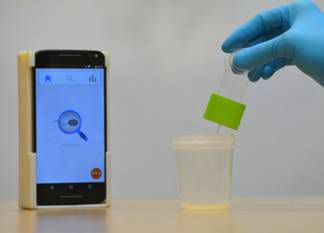Guys: It’s now possible to test your sperm via smartphone

When a man suspects his sperm isn't hitting home runs, the only way he can be certain is to go to a lab to get tested.
You know the scene as a Hollywood gag: a man walks into a closet-sized room with a stack of X-rated magazines and delivers a sample to a lab tech, but not before doing or saying something wildly embarrassing.
SEE ALSO: Instead of telling women who might get pregnant they can't drink, study suggests trusting them
While filmmakers play it for laughs, experts say the costly lab visit and prospect of humiliation, or at the very least, awkwardness, might be keeping men from learning more about their fertility.
Now a group of scientists has a solution for taking the anxiety and expense out of sperm testing. The Boston-based team developed an app and camera attachment to analyze sperm quality using a smartphone.
They presented their findings in a study published Wednesday in the journal Scientific Translational Medicine.

Image: Manoj Kumar Kanakasabapathy & Prudhvi Thirumalaraju
While it's not the only at-home testing product of its kind, it's the first to analyze both sperm concentration and how well the cells can move, which are critical to getting a fuller picture of fertility. The study's results show that the device can identify abnormal semen samples with 98 percent accuracy compared to traditional testing methods, which use bulky microscopes and require highly-trained technicians.
Hadi Shafiee, co-author of the study and principal investigator at Brigham and Women’s Hospital, said the team will continue refining the prototype and eventually file for approval from the Food and Drug Administration (FDA).
Ideally, he said, the kit would be available to consumers in the next few years, making at-home male infertility testing as easy and accessible as pregnancy tests and ovulation kits for women. More than 45 million couples worldwide experience infertility and more than 40 percent of those cases involve male infertility.
"There are so many products for women in the market, but there are not so many for men," Shafiee said. "We wanted to close this gap and we think this type of technology can reduce [a couple's] stress and help the patients understand where [the] problem comes from and go to the next step."
Men could potentially use the as-yet-unnamed kit by taking a small semen sample and placing it on a disposable microchip, which is then inserted into an optical attachment connected to the phone. (And no, the semen doesn't touch the phone.)
When the app is launched, it guides the user through the testing steps. The data is stored on the phone itself, and the user can delete it or choose to share it with a doctor.
The study's authors say the smartphone accessory and microchip cost $4.45 to build, compared to tens of thousands of dollars spent on the traditional computer-assisted analysis platform. Though the team tested the product on Android phones, Shafiee said it can be adapted for an iPhone.
Michael Eisenberg, who specializes in male fertility as an assistant professor of urology at Stanford Medical Center, said the device and app appeared reliable and well-thought out based on the study's results. Eisenberg was not involved in the new research.
Men, he added, are underserved when it comes to infertility testing, partly because it's "incorrectly seen as a woman's problem." In 20 to 25 percent of infertility cases, men aren't even evaluated. That could change, Eisenberg said, with home-based testing that made it easier and less anxiety-inducing to analyze a sperm sample.
Such devices can also help men monitor their sperm quality even if they're not trying to conceive. Getting a vasectomy, for example, requires sperm testing weeks afterward to ensure the procedure worked. And men hoping to improve their sperm quality by making diet, exercise and lifestyle changes, could use home-based testing to monitor before-and-after differences.
"I’m very excited to see the future," Eisenberg said. "Hopefully we’ll have an array of choices at the supermarket."
